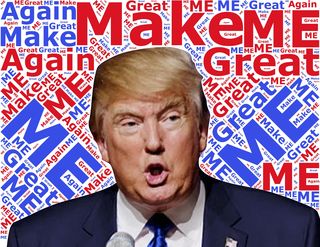President Donald Trump
Trump: The Master Distractor
What psychology says about our presidential election and the American public
Posted November 7, 2016
[NOTE: I wrote parts of this blog post weeks ago and then decided to hold off on blogging about the election. I feel that I can no longer do that with the election as close as it appears to be.]

No doubt that this has been the most bizarre presidential election in U.S. history and for many it makes no sense why Donald Trump continues to look like he has a chance to win the presidency and even if he loses, he will likely win 40% or more of the vote. I believe that I know at least a few reasons why this is happening that have nothing to do with political agendas or angst about our American political system. Adam Gazzaley and I have just published a book called The Distracted Mind where we detail from both neurological and psychological points of view why we are all so easily distracted. The upshot is that our brains have not changed much since we were cavemen and we still have the same limited resources that our ancestors used to live their lives. And our ancestors did not have to deal with all of the technology that has inundated our lives in the past few decades.
Donald Trump is a master at capitalizing on our limited attentional resources by pummeling us with “bottom-up” stimuli—those that are coming into our brains from the outside world—at precisely the time that we need to be spending more time diving deeply into the issues using our “top-down” attention to integrate all this information and derive strategies for dealing with our world. We strive, as humans, to use our top-down attention to direct our finite resources to making informed decisions instead of dealing with a constant bombardment of bottom-up stimuli. Trump, the master of providing bottom-up stimuli has offered a deluge of incendiary tweets, one-liners and even derogatory nicknames. Say “Ted Cruz” to someone and their immediate response will be “Lyin’” Ted. Elizabeth Warren is “Pocahontas” and we all know “Crooked” Hillary. These assaults on our limited attentional resources are not random. They are planned and well executed and I stand in awe of how Trump has been able to take advantage of an American population that has been found in my own research and that of others to have an attention span of three-to-five minutes. Even more startling, a recent Microsoft Corporation study asserted that since 2000 when the smartphone revolution began, the average attention span has dropped to eight seconds (a goldfish has an attention span of 9 seconds), admitting that “heavy multi-screeners find it difficult to filter out irrelevant stimuli – they’re more easily distracted by multiple streams of media.” And what is more irrelevant that name-calling in a presidential election?
We have all heard that Donald watches massive amounts of television news. And we also know that he possesses most, if not all, of the symptoms of narcissistic personality disorder. Narcissists crave attention. Imagine Donald noticing that he was not the lead story on CNN or was only getting small sound bites on NBC. Donald the narcissist gets upset and does something to get more face time. What does Donald do? He makes outrageous statements that immediately vault him to the headline story of the day. And he knows exactly what to say to top the news cycle. The more inflammatory the better. Insult John McCain, BOOM, headlines abound. Get into a fight with a gold star family, BOOM, above the fold for a week. Nickname Senator Elizabeth Warren Pocahontas and he gets everyone shouting at him … until the next slur distracts us and averts our attention.
And Donald knows exactly what he is doing. His advisors want him to talk about policy but he eschews that to talk about the latest attack. Why? Because he knows that people don’t really want to hear policy from him. They want and expect controversy. He doesn’t care what he says because he knows several facts about Americans. First, he knows that we have a short attention span and that means that we rarely spend enough time to process information deeply enough to make it “stick” in our brains. Second, he knows that we have become easily bored and when we are bored we reach for our smartphone to see what Donald said today. I once joked that a smart person would build a new television channel called, “All Trump, All the Time” and now it appears that may be a reality (pun intended).
Third, Donald knows how to talk to Americans at their level. Studies have shown that based on the respected Flesch-Kincaid readability test, the average U.S. voter reads at somewhere between the 4th and 8th grade level. In analyses of speeches by various political figures, statements by those in Congress were found to be between the 10th and 11th grade levels in 2012 (down, interestingly, from the 11.3 grade level in 1996). Donald Trump’s presidential announcement speech was written at the 4th grade level.
In contrast, Hillary Clinton’s announcement speech was written at the 8th grade level. Bernie Sanders’ speech was at the 10th grade level. Analyses of multiple campaign speeches by past presidents showed that George Bush spoke at the 5th grade level followed by Mr. Trump speaking at grade 5.7. In contrast, President Obama’s speeches were written at nearly the 8th grade level as were President Bill Clinton’s. President Reagan’s spoke at nearly the 9th grade level and President Lincoln’s Gettysburg Address was clocked in at the 11th grade level. Trump’s answers to moderator questions at one debate were rated at the 4th grade level.
Why is Donald Trump speaking with such a simplistic vocabulary and using 4th grade language and grammatical sentence structure? Why does he tweet so often using caustic 140 character missives replete with derogatory nicknames? Putting it simply, he is smart! Well, maybe not politics smart, but certainly people smart. He is well aware that he is speaking to a population that is, for the most part, undereducated. He even said at a campaign rally, “I love the poorly educated!” And he does. He aims low and connects often which then distracts our attention from comparing candidates on issues and instead forces our taxed brains to focus on those miniscule “bottom-up” details that he trots out nearly daily.
And the media loves it! A new sound bite each day that grabs the readers and listeners at their own reading level brings viewers. Estimates are the Trump has received nearly $3 billion in free advertising from the media, all of which is centered on his ability to reach the average American.
When Dr. Gazzaley and I decided to write The Distracted Mind we focused on a model of how and why we get so distracted based on peoples’ everyday lives and how those distracted moments negatively impact our ability to learn, to communicate with our loved ones, to pay attention to our world and to survive. We offer valuable suggestions to help people recapture their attentional abilities and enhance their lives. Little did we imagine that the concepts in our book would so quickly be adapted to using distraction for one’s political benefit. We all are acutely aware that we get distracted easily and often. But there are times for allowing those distractions to deter us from deeper thinking and a presidential election should not be one of those times. We need to eschew the Trump tweets, name-calling and short, pithy attacks and spend time using our “top-down” resources to compare candidates on their platforms rather than their “bottom-up” attempts to distract our attention.
Recently, Newt Gingrich complained to Megyn Kelly that the three major networks’ nightly news spent 23 minutes discussing allegations of Trump’s sexual harassment and only 57 seconds on Hillary’s secret speeches. Knock it off, Newt! That is exactly what Donald Trump wants. More face time means more distraction and, in Trump’s mind, more votes. A presidential election is the time for thoughtful discourse and distractions interrupt those efforts and lead to uninformed decisions. Elections should be about policies and distracting our attention from understanding the differences between the candidates on what they will do as president of the United States has no place in our political structure.
[POSTSCRIPT: The Flesch-Kincaid Scale places this blog post at the 9.7th grade level]




